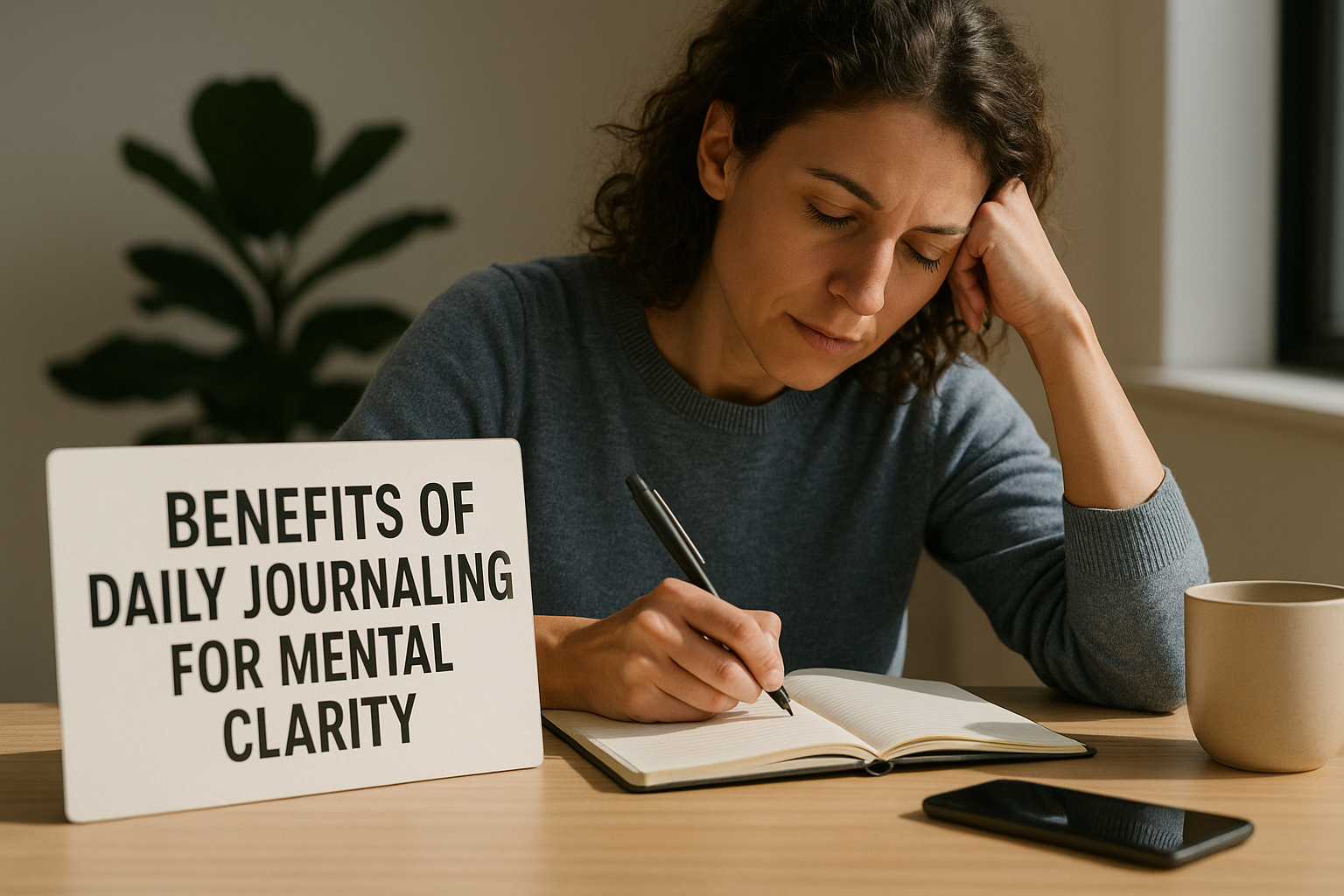What Is Journaling and Why It Matters
Journaling is the practice of writing down thoughts, feelings, ideas, or plans to help clear the mind and process emotions. While it might sound simple, this small habit can have profound effects on mental well-being.
Contrary to myths, journaling is not just “diary writing.” It includes:
-
Bullet journaling
-
Gratitude journals
-
Goal tracking
-
Stream-of-consciousness entries
You don’t need to be a writer to benefit—all you need is consistency and intention.
How Journaling Affects the Brain
Scientific research supports the power of journaling:
-
Cognitive Function: Writing improves memory consolidation and organizes chaotic thoughts.
-
Emotional Regulation: Journaling activates the prefrontal cortex, reducing emotional reactivity.
-
Stress Processing: Writing helps translate vague worries into concrete solutions.
The result? Better decision-making, mood control, and mental focus.
17 Mental and Emotional Benefits of Journaling Daily
-
Reduces Stress: Writing helps offload worries and eases mental tension.
-
Clarifies Thoughts: Journaling helps make sense of scattered thinking.
-
Improves Focus: Clears distractions, increasing present-moment awareness.
-
Regulates Emotions: Allows emotional expression without judgment.
-
Improves Sleep: Especially when journaling before bed to unload mental clutter.
-
Supports Better Decisions: Seeing thoughts on paper improves objectivity.
-
Builds Self-Awareness: Identifies thought patterns and emotional triggers.
-
Tracks Goals and Progress: Keeps you aligned with long-term aspirations.
-
Boosts Gratitude: Gratitude journaling elevates daily mood and satisfaction.
-
Reduces Anxiety: Creates a safe space to process overwhelming feelings.
-
Manages Anger: Writing diffuses intensity and brings perspective.
-
Enhances Creativity: Frees the mind to brainstorm and imagine.
-
Processes Trauma: Aids emotional recovery in a structured, private way.
-
Improves Problem Solving: Journaling promotes clearer analytical thinking.
-
Monitors Mood Patterns: Spotting trends helps with emotional regulation.
-
Builds Positive Habits: Reinforces mindfulness and consistency.
-
Increases Productivity: A written plan brings accountability and clarity.
Best Practices for Starting a Journaling Habit
Getting started doesn’t require fancy notebooks or perfect grammar. Here’s how to make it stick:
-
Set a Routine: Mornings or nights work best. Choose a consistent time when you’re unlikely to be interrupted.
-
Use Prompts: Questions like “What am I grateful for today?” or “What’s causing me stress?” guide your writing.
-
Be Honest: Your journal is a judgment-free zone. Authenticity brings clarity.
-
Keep It Simple: Just a few sentences a day can deliver big mental benefits.
-
Don’t Aim for Perfection: Spelling and structure don’t matter. What matters is expressing yourself.
Consistency, not complexity, is the secret to journaling success.
Digital vs Pen-and-Paper Journaling
Each method has its pros and cons. Here’s a breakdown:
Aspect Digital Journaling Pen-and-Paper Journaling Convenience Easy to store and search More tactile, immersive experience Privacy Can be password protected Easier to hide, but can be lost or damaged Speed Faster typing Slower, but may improve retention Focus May cause distraction via notifications Zero digital distractions Choose the format that encourages regularity and emotional comfort for you.
What to Write in Your Journal?
Some useful journaling ideas include:
-
Gratitude Lists: Name 3 things you’re grateful for each day.
-
Brain Dumps: Write everything on your mind in raw, unfiltered form.
-
Mood Logs: Track feelings, triggers, and events to spot patterns.
-
Goal Check-Ins: Reflect weekly on progress and realign where necessary.
-
Reflection Prompts: Questions like:
-
“What did I learn today?”
-
“What am I avoiding?”
-
“What do I need to forgive myself for?”
-
These topics help journalers gain clarity and control over their internal narrative.
Common Challenges and How to Overcome Them
1. Writer’s Block
-
Try bullet points or sentence starters.
2. Time Constraints
-
Even five minutes of writing can reset your day.
3. Fear of Judgment
-
Remind yourself: no one else will read it.
4. Inconsistency
-
Set reminders, pair journaling with another habit (like morning coffee).
Overcoming these roadblocks turns journaling into a sustainable mental wellness tool.
FAQs About Journaling for Mental Clarity
Q1: How long should I journal each day?
Just 5–10 minutes can provide real benefits. It’s about quality, not quantity.Q2: Does it matter when I journal?
Morning journaling sets the tone for the day. Evening journaling aids in reflection and better sleep.Q3: Can journaling replace therapy?
It’s not a substitute, but a great complement to professional care.Q4: What if someone reads my journal?
Use a lockbox, digital protection, or choose digital journaling apps with encryption.Q5: What if I skip a few days?
That’s okay! Journaling should feel helpful, not like a burden. Pick up where you left off.
Conclusion: A Simple Habit That Transforms Your Mindset
In a noisy world, journaling provides a moment of quiet—a space to breathe, reflect, and reset. Whether you’re seeking clarity, healing, or simply a bit more focus, this habit can transform the way you think, feel, and act.
The benefits of daily journaling for mental clarity are not just emotional—they’re neurological, practical, and deeply personal.
🖊️ So grab a pen, or open a notes app, and start writing your way to peace of mind.
🔗 External Resource: Psychology Today – Why Journaling Is Good for Your Brain
-



